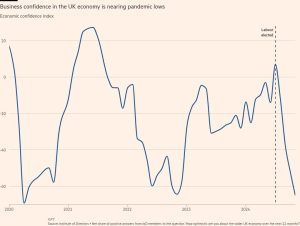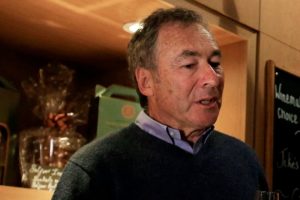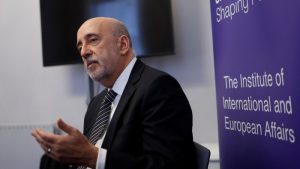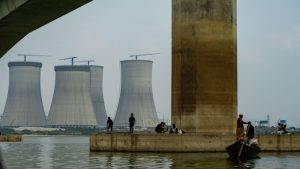Syria’s acting finance minister pushes plan to revive war-torn economy
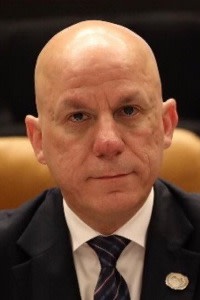
Unlock the Editor’s Digest for free
Roula Khalaf, Editor of the FT, selects her favourite stories in this weekly newsletter.
Syria’s vital border crossing with Jordan is set to reopen on Sunday for the first time since rebels toppled Bashar al-Assad’s regime, the country’s de facto finance minister said, as its new rulers seek to keep the crisis-hit economy afloat.
Riad Abd El Raouf, who served under Assad’s deposed government and has stayed on in an acting capacity, told the Financial Times he expects the new leadership of the Syrian Salvation Government to provide forces and staff to run the Nasib crossing, one of the busiest trading points.
The border has been unmanned since rebels ousted Assad on Sunday. Syrian businessmen instructed trucks carrying imports from Jordan to retreat last Friday after rebel forces reached the nearby city of Deraa.
“The entry of products will make their distribution easier,” Abd El Raouf said, which he added should help allay widespread concerns about potential food shortages and ensuing instability.
Eager for the capital Damascus to return to business as usual, rebels have instructed ministries and shops to reopen and told the oil company to resume supplying fuel.

In a sign of the uneasy calm, the Syrian pound has stabilised in recent days. After doubling to S£30,000 to the dollar following the takeover, it returned to its average of S£15,000 by Wednesday.
Abd El Raouf, an economics professor, was only appointed to the post two months ago when a new government was formed, and previously served in various roles inside the ministry.
Hayat Tahrir al-Sham, the Islamist rebel group that led the offensive, has not yet announced who will be in the new cabinet. In the meantime, it has instructed all employees to return to their jobs, making no exceptions for loyalists, in order to avoid a power vacuum and lapse in government services. The group told the FT it will re-evaluate people’s roles according to their efficacy.
Abd El Raouf did not say how long he expected to continue in the post, but he said the new government would carry out “a re-examination of all current monetary and economic policies”, adding that he expects it to introduce a free-market economy to replace Syria’s infamously corrupt pseudo-socialist system.
Abd El Raouf also said he expects the new interim leadership to re-evaluate its agreements with foreign countries, namely Russia and Iran, as it begins to tackle the country’s crushing public debt burden.
But he said special care should be taken for agreements brokered by Assad’s government with Russia, as it was not yet clear whether the new government and Moscow would want to sign trade deals in the future.
HTS suggested last week that it was willing to work with Russia, despite its stronghold of Idlib being the target of relentless Russian air strikes for much of the past decade.
Syria has been a pariah state since the start of its brutal civil war in 2011. It has been shunned and sanctioned by western governments, relying on Russian and Iranian credit lines for food imports and military aid.
These only propped up Assad and did little to improve people’s lives amid widespread corruption and a regime that gorged on what was left of the economy.
“We are counting heavily on the lifting of sanctions to facilitate development during this coming period,” he said. HTS, however, would have to be delisted from global terrorist lists first, which diplomats have suggested could happen depending on how it rules.
Syria has been in a state of economic collapse for years: more than 70 per cent of the population live below the poverty line amid soaring unemployment and rampant inflation.
But the extent of the country’s debt burden is still unclear, Abd El Raouf said, due to the opaque nature of Assad’s centralised rule. Individual ministries have long brokered contracts with foreign backers, notably the ministry of defence, which bought a steady supply of Russian weapons.
In preparation for the handover of power, the ministry tallied public sector salaries on Tuesday, putting the figure at 14tn SYP per year, almost $1bn. Abd El Raouf said the new government soon intended to adjust salaries, which currently average around $25 month.
Corruption lies at the heart of every ministry, he said. The calculation of tax revenue, which totals about 70 per cent of public spending, is often left up to employees who abuse their positions to curry favour with businessmen, he said, lowering taxes in exchange for bribes.
This “allowed for the growth of specific [assets] held by specific [people]”, he said, alluding to businessmen close to the president who enjoyed advantages like the erosion of competition and import monopolies.
“This distorted the economy, and as a result there is a specific chunk of wealth that is not being returned back to the people,” he said.
#Syrias #acting #finance #ministerpushes #planto #revive #wartorn #economy

